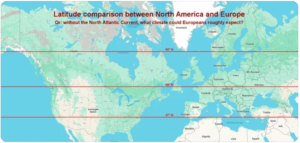The United Kingdom could experience winters as cold as northern Canada – if warming waters from the tropics stop flowing in a collapse of the ocean system called “AMOC” – the Atlantic Meridional Overturning Circulation. You hear the latest science from Dr. Stefan Rahmstorf. UK author and strategist Laurie Laybourn joins us. Philip Boucher-Hayes explains expectations in Ireland. From Utrecht University, Rene van Westen predicts AMOC collapse before 2057 and an extra meter of sea level rise to boot.
The program begins with a clip from BBC reporting on the Big Freeze of 1963. I’m Alex, this is Radio Ecoshock.
Listen to or download this Radio Ecoshock show in CD Quality (57 MB) or Lo-Fi (14 MB)
The AMOC is a big pump bringing warm waters northward, including in the Gulf Stream. Then it sinks into deep cold flows heading all the way back to Antarctica. Within the last ten years, scientists became alarmed the AMOC is weakening. Studies of past climates show the AMOC has stopped before, in similar warming situations. Climate models show it will stop again if we continue heating the planet.
Dozens of scientists from dozens of countries are deeply concerned. They are raising red warning flags to governments and you, the public. We begin with scientist Stefan Rahmsdorf explaining what we know to the Nordic Council of Ministers. Then Laurie Laybourn returns. He’s with a group of scientists and strategy think-tanks with a new report on a possible, quote “planetary cataclysm” and weather impacts so dire in the United Kingdom that national security is threatened. In my reading of this report, it is a coin-flip possibility much of Scotland, Ireland, and Britain will grow closer to ice age times, even as the rest of the world overheats. Southern Scandinavia would feel more Arctic, Norwegian ports would freeze over for months. Agriculture across the region could collapse.
As we will hear, the impacts don’t stop there. Rainfall across the world would change with the sea currents, possibly affecting the monsoon rains that feed Africa and India. Fisheries and natural systems could change or collapse. It is also possible this AMOC tipping point could trigger others, starting a cascade of big climate shifts beyond adaptation, really beyond our comprehension.
If the North Atlantic overturning stops, ending heat transfer to northern Europe – that could be the biggest single shock of climate change. It would be the biggest news in all human history. There is at least a 40% chance, some say higher, the AMOC could collapse this century. We don’t know when. It could start in the next few years, or maybe decades – or even stranger, the tipping point may be behind us. All we know is: every year of record greenhouse gas emissions like 2023 and 2024, makes this massive change in ocean currents more likely, and coming sooner.
===============================
STEFAN RAHMSTORF
WORRY ABOUT AMOC COLLAPSE NOW
The strongest voice on AMOC collapse is Dr. Stefan Rahmstorf from the Potsdam Institute for Climate Impact Research (PIK). In October 2024, Stefan Rahmstorf gave a 15 minute wrap up of new science and terrible concern over the risks of North Atlantic currents weakening or even stopping. This was at a meeting of Nordic Council ministers in Reykjavík, Iceland. He then presented an “Open Letter by Climate Scientists to the Nordic Council of Ministers”.

This is a moment reminding us of 1988, when James Hansen told Congress the world was heating up due to our fossil fuel emissions. Now again, governments threatened by a massive change to their climates have been directly notified by the top scientists working in the field.
It also tells us this is not just a pet project for Stefan Rahmstorf or the Potsdam Institute for Climate Impact Research. I went over the list of forty four scientists signing the letter of concern. Naturally they are heavily from places fearing an AMOC change, like countries around the Baltic, Scandinavia and the UK. But well-known scientists from the United States, like Michael Mann, from Australia, China and more – all warn this big change is becoming more possible as we heat the world.
In the program you hear the unedited talk in Reykjavik by Stefan Rahmstorf to the Nordic Ministers in October 2024. Rahmstorf is a physicist and physical oceanographer by training. He worked on Atlantic currents and climate since the 1990’s. He admits for years he underestimated how soon this could arrive. This is the best clear summary of what we know. Everyone in the world needs to hear this.
THE LETTER SAYS:
ADAPTATION TO AMOC COLLAPSE “NOT A VIABLE OPTION”
“The impacts particularly on Nordic Countries would likely be catastrophic, including major cooling
in the region while surrounding regions warm. This would be an enlargement and deepening of the ‘cold blob’ that already has developed over the subpolar Atlantic Ocean, and likely lead to unprecedented extreme weather. While the impacts on weather patterns, ecosystems and human activities warrant further study, they would potentially threaten the viability of agriculture in northwestern Europe.
Many further impacts are likely to be felt globally, including a shift in tropical rainfall belts, reduced oceanic carbon dioxide uptake (and thus faster atmospheric increase) as well as major additional sea-level rise particularly along the American Atlantic coast, and an upheaval of marine ecosystems and fisheries.
Recognizing that adaptation to such a severe climate catastrophe is not a viable option, we urge the Council of Nordic Ministers to (a) initiate an assessment of this significant risk to the Nordic countries and (b) take steps to minimize this risk as much as possible. This could involve leveraging the strong international standing of the Nordic countries to increase pressure for greater urgency and priority in the global effort to reduce emissions as quickly as possible, in order to stay close to the 1.5 °C target set by the Paris Agreement.”
====================
OCEAN CURRENT COLLAPSE AS NATIONAL SECURITY THREAT
LAURIE LAYBOURN
Is the United Kingdom facing a climate collapse like nothing in human history? Laurie Laybourn is a visiting fellow at the University of Exeter’s Global Systems Institute, and at both Chatham House and Institute for Public Policy Research. He appears often in European publications, TV and radio.

In October Laybourn and eight co-authors released a report called: “The security blind spot: Cascading climate impacts and tipping points threaten national security”. Say “security” and we think armies, weapons, anti-terrorism. Laurie explains climate change is now a pressing national security issue. The authors have a broad definition of “Security” saying
“These go beyond the traditional defense domain to encompass the full range of human security concerns, including food, economic stability, public health, nature, peace-building and geopolitics.”
Following an October 2024 presentation to the Montreal Climate Security Summit, leading Potsdam Institute researcher Stefan Rahmstorf said on X:
“It is clear that military leaders and security experts have recognised that climate change is a major – even THE major – threat to our future security.”
Listen to or download this 27 minute interview with Laurie Laybourn in CD Quality or LoFi
WOULD AMOC BE A “PLANETARY CATACLYSM”?
The risk of collapse of ocean current collapse in the North Atlantic is too huge to imagine. It doesn’t fit within our daily lives, our education, or anything experienced by humans. Some of our listeners know AMOC, the Atlantic Meridional Overturning Circulation. If this current stops, or even significantly weakens, this will be the biggest story in history.
In press statements, Laybourn said an AMOC collapse would be a “planetary cataclysm”. The impacts are hardly contained to the UK, Ireland, Scandinavia and North Europe. Models and studies of the deep past suggest atmospheric rain systems, like the monsoons that feed Africa and India, could shift away. Even the Amazon climate would be affected. Plus, as Rene Van Westen explains in a following clip, sea levels along the coasts of the North Atlantic would rise an extra one meter – above and beyond global sea level rise. More on that below.
On Radio Ecoshock, I talked with scientists like Levke Caesar, Susanne Ditlevsen, and Johannes Lohmann. They were looking for early warning signs that the North Atlantic overturning system is failing. Those warning lights are blinking now. This is not all models, but also from observations taken by open-sea measurement buoys that drop down a couple of thousand feet before resurfacing and reporting by satellite. Scientists get a glimpse of changing flows, temperatures, and salinity in Atlantic, from the Arctic to Antarctica.
This isn’t like the movie “The Day After Tomorrow”. An AMOC collapse would not occur in a week. It might take ten years or more to reach a new state. The impacts might play out over a century – but the weird thing is: we may have already passed the tipping point. We don’t know, and that is a huge thing to not know.
ANOTHER WORRY: THE SPG
New to me in this report, Laybourn and team find a subset of the AMOC current that is also vulnerable to weakening, or even stopping. That is the SPG, the sub-polar gyre. The SPG is an extremely large whirlpool hundreds of miles away from the coast of the UK or Ireland. Part of it swirls near Labrador Canada. Yet a change in the gyre of current can significantly affect weather and agriculture in the UK.

Laybourn tells us the SPG requires less global heating to stop spinning. So it may tip first and this new report finds up to a 45 per cent chance the subpolar gyre could collapse this century, and may happen before 2040. The report warns we are “flying blind’ on the SPG and it may already have stopped. Our guest scientist from Australia, Dr. Matthew England published similar warnings about weakening of Antarctic overturning circulation. He told us that may have already tipped. Matthew studied the Southern end of the giant global water pump dispersing heat from the Equator. I wish more scientists in the North would include this in threat estimates for collapse of the North Atlantic Overturning. They are all connected in “the Great Conveyor Belt” of ocean circulation.
Other studies, some from decades ago, warned the global ocean would become more stable and stagnant in a greenhouse world. Instead of vertical flows bringing nutrients up to the light and plankton, the sea could become stratified into layers that mix less. That would be a disaster for sea life as we know it. As far as I can tell, this stabilization would be in a more distant future, perhaps centuries away? But weakening of currents in the North Atlantic and Antarctica may be part of that process.
IS THE UK GOVERNMENT DOWNPLAYING THIS THREAT?
Laurie and I talked about dangerous odds of the sub-Polar gyre stopping, or even the whole North Atlantic overturning system. But that is not what the UK Government is telling the public. If I ask the Met Office, they say a collapse is an “unlikely possibility”. They cite another government-funded study that reviews North Atlantic science and finds “no clear overall trend” in the AMOC.
The Met Office bases the “unlikely possibility” on this report from another Government-funded agency, CEFAS: “Climate Change Impacts on Ocean Circulation Relevant to the UK and Ireland.pdf” The link here seems long, but this is the only place I can find it.
The report is hosted by “Marine Climate change Impacts Partnership” – also funded by the government. Though citing work by Levke Ceasar et al, it still finds “no clear overall trend” in the AMOC. The lead author is Dr Gerard McCarthy from Maynooth University in Ireland.
I was surprised to see McCarthy as a Signatory on the letter from 44 scientists re: AMOC risk to the Nordic Ministers. I asked him to explain – had research changed his mind? McCarthy replied by email:
“Yes, my view of the newest research is that we’ve underestimated this risk. Studies have been published in the past few years that indicate the risk of tipping is higher than we thought (these have been published since the CEFAS review). In addition, passing a tipping point is not the same as seeing an abrupt slowdown, which we haven’t seen yet. Due to the high impact nature of AMOC collapse, I was happy to sign a letter urging for more action on climate change mitigation and further research into the impacts of AMOC tipping.”
– personal email Oct 31, 2024
Read more about harsh impacts on the UK in this recent article in The Times “The UK could turn as cold as Scandinavia. Why aren’t we preparing?”
Laurie Laybourn told the Times: “There’s been no full risk assessment of AMOC collapse. Having lived through Covid, we now know that it affected everything and that there needs to be risk assessments of all the cascading consequences of another pandemic. There hasn’t been the same process for AMOC collapse. It could impact everything. It is probably the worst conceivable impact on food security that could happen right now.”
According to Ben Cooke in the Times October 16, 2024:
“One paper, published in 2020, estimated that in this new climate, only 7 per cent of Britain would be suitable for arable farming, compared with 32 per cent now. Farmers could cancel out this drastic reduction by expanding irrigation, but that would be extremely expensive, costing ten times more than we pay now for the food it would produce.
The impact wouldn’t be limited to Britain. According to research commissioned by the Organisation for Economic Co-operation and Development (OECD), it would cut the amount of land available worldwide for growing wheat and maize by more than half — crops that together supply two-fifths of global calories.”

JUST IMAGINE
If a country is ravaged by climate change, with agricultural failure followed by food shortages and public unrest – we can imagine another hostile country, or even a friendly one, might expand their territory in the name of establishing order and “helping”. Assuming climate disasters are unevenly distributed, as they are so far, that may create vacuums of power inviting invasion. That is a geopolitical threat coming from local or regional climate disasters.
Picture the UK after AMOC collapses. Winters are six months of extreme cold, as found at the same latitude in semi-Northern Canada, or the far north of Scandinavia. Demand for gas to heat homes would be higher than supplies. Some people die in the cold. Others burn whatever trees or forests are nearby to survive the winter. Many farm animals die, along with wild birds and wild life. None are adapted for the harsh new climate. The electric grid is intermittent, often going down for hours or days.
In an extreme case (“if”) – the shock of going from fossil-powered comfort to Medieval struggle would be huge for the survivors. All this sounds like science-fiction, or rambling from old crackpots. Yet the source of this information comes from seasoned scientists, many in the UK and North Europe, supported by satellite and sea observations, plus very high-tech computer models. This warning comes from well-known Universities and Institutes.
THE LAYBOURN-LED REPORT CONCLUDES…
“The UK appears more poorly prepared to handle major climate-security threats than pandemics: it is not resilient to current climate conditions and cascading risks, let alone future threats, including some of the most severe, such as SPG collapse. Climate change is not just creating a series of worsening events; it is creating a new era of complex and evolving challenges for all areas of national and international security. Yet the UK does not have adequate early warning systems for the complex threats it faces today, nor possible future threats like SPG collapse. This stifles the ability to forecast and prepare.
Our central recommendation is that the government undertakes a rapid national security risk assessment of climate change to establish a full picture of the security consequences of climate change, identifying the most critical threats and choices for improved risk management, and catering for a national security audience at the highest level. Other countries have undertaken a similar exercise.”
SEE ALSO: This helpful article in Clean Technica on AMOC collapse impacts.
=======================================
IRELAND AND AMOC
BOUCHER-HAYES
Less covered but not less loved, Ireland is parked in North Atlantic currents keeping it much warmer than it’s latitude. Dublin is at the same latitude as Edmonton in north Alberta Canada, 53.5 degrees N.. While the average January temperature in Dublin is 5 degrees C, or 41 Fahrenheit – January in Edmonton averages to -12 C. or 10 Fahrenheit. Only the AMOC keeps Dublin from the bitter cold winters of northern Canada.
What are media in Ireland telling their people? Find a high-quality, slightly conservative, presentation on “Today with Claire Byrne”, RTE Radio, the national public broadcaster. I play a short clip from presenter Philip Boucher-Hayes on September 13, 2024. Philip Boucher-Hayes on X is worth following, if you can stomach the new right-wing incaration of Twitter.

===============
AMOC COULD TIP IN COMING DECADE(S)
RENE VAN WESTEN
The projection of AMOC tipping by 2057 comes from new science led by Rene van Westen in the Netherlands. Published in Science Advances in February 2024, the title is: “Physics-based early warning signal shows that AMOC is on tipping course.” Van Westen found over a 100 year period, temperatures in Northern Europe could drop 10 degrees Celsius (18 F), so London might go as low as minus 40 degrees in February for example.

In addition to his 2057 prediction, Rene van Westen clearly explains how Atlantic current weakening, or even collapse, would add up to a meter, three feet of sea level rise to north European and UK coasts – on it’s own, on top of rising seas already expected from warming and glacier melt. This is amazing and new.
In this program I play two key clips from Rene van Westen, PhD Candidate at Utrecht University, interviewed by researcher and presenter Dave Borlace on his popular YouTube show called “Just have a think”.
SEE ALSO:
“The AMOC Tipping Point (And what we need to know!) with Dr René van Westen” with Nick Breeze of ClimateGenn.
======================
ALEX OUT
This program is not a Halloween horror show to get attention. If we are lucky, the AMOC or it’s sub-current may only weaken. I have included cautions. Great Britain may remain “great”. But this invasion of cold gets more likely with every ton of carbon, indeed every gallon or liter of gas burned. Nothing in our history or psyche prepared us for this big climate twist. Climate action now – or we lose it all.
We are out of time, in more ways than one. I’m Alex. I care about you and our world. Thank you for listening.
